- April 18, 2025
Welcome to Dementia World elderly home services



Did you know nearly 1 in 1,000 pregnancies in developed countries are affected by neural tube defects? These are linked to not enough folate during pregnancy. This shows how important diet is for brain health, not just for pregnant women but for everyone.
Experts say eating the right foods can really help your brain. They tell us that good nutrition can make our minds work better and feel happier. The BrightFocus Foundation says the right foods can help keep our brains sharp as we get older.
We will look at the key nutrients for brain health. We’ll also talk about foods that boost brain power. And we’ll share tips on how to eat better for a healthier mind.
Studies show a strong link between diet and brain health. Bad diets can harm our brains, affecting how we think and act. For example, being overweight can lead to brain diseases like Alzheimer’s.
Diabetes and obesity raise the risk of brain disorders. This shows how important our diet is for our brain’s health.
High-fat diets can cause inflammation in the brain. This might explain why obesity is linked to brain diseases. Early research linked red meat to dementia, but now we know it’s mainly processed meat.
Processed foods lack nutrients but have more bad stuff like sugars and fats. Eating foods that are less processed, like those in the Mediterranean diet, can help our brains.
This diet includes whole grains, legumes, and some red meat. It’s good for our brains and overall health.
The gut and brain are closely linked. Up to 95% of serotonin, which affects mood, comes from the gut. Foods rich in probiotics and prebiotics can improve gut health and brain function.
Diets full of antioxidants, phytonutrients, and fibre boost mood and brain power. Our diet shapes our brain health from the start to the end of our lives.
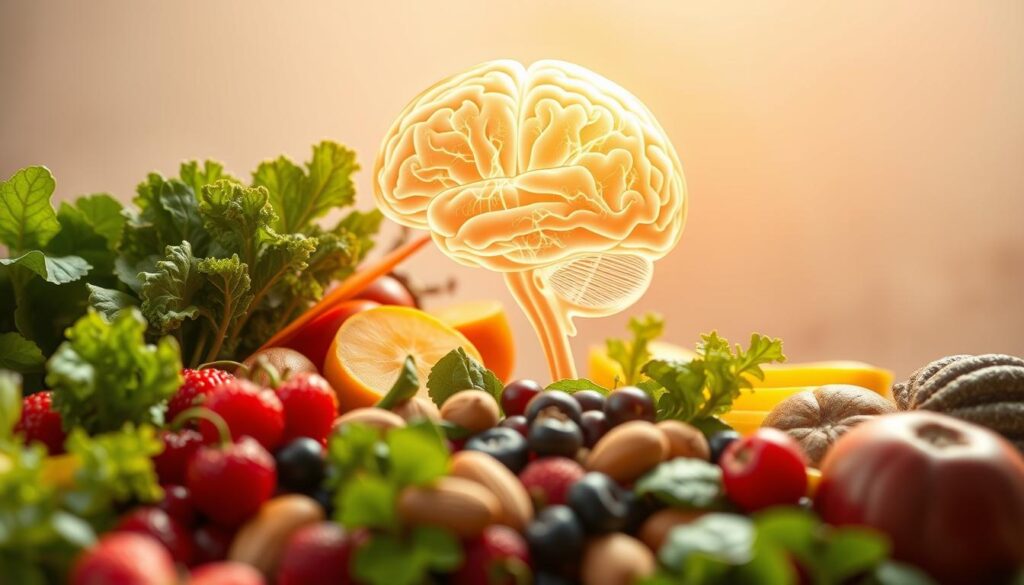
| Dietary Factor | Impact on Brain Health |
|---|---|
| High-fat Diets | May trigger neuroinflammation, linked to neurodegeneration |
| Processed Meat | Increased risk of dementia relates mainly to processed products |
| Minimally Processed Foods | Promote brain health through nutrient preservation |
| Antioxidants and Phytonutrients | Support improved mood and cognitive function |
| Probiotic Foods | Enhance gut flora, promoting a healthy gut-brain connection |
It’s important to know how essential nutrients help our brains work well. Vitamins, minerals, and fatty acids play a big role in keeping our brains healthy.
Vitamin B complex, including B6, B12, and folate, is key. They help break down homocysteine, a substance that can harm our brains. Without enough B vitamins, we might struggle with memory and thinking skills.
Vitamin E acts as an antioxidant, protecting our brain cells from damage. Vitamin D, found in many brain cells, is also vital for brain health and thinking.
Omega-3 fatty acids, like DHA, are a big part of our brain. They help our brain cells talk to each other and remember things. Eating foods rich in omega-3s can help keep our brains sharp as we get older.
Here’s a table that shows the important nutrients for our brains:
| Nutrient | Role in Cognitive Function |
|---|---|
| Vitamin B6 | Aids in neurotransmitter synthesis and metabolism of homocysteine. |
| Vitamin B12 | Crucial for nerve health and cognitive performance. |
| Folate | Involved in DNA synthesis and repair. |
| Vitamin E | Protects against oxidative stress, which can impair cognitive function. |
| Vitamin D | Essential for brain health and may improve cognitive performance. |
| Omega-3 Fatty Acids (DHA) | Supports neural communication and enhances memory. |
Eating foods with these nutrients can improve our brain health. A balanced diet with these foods can help us stay sharp and avoid brain problems as we age.

Adding certain foods to your diet can really help your brain. These foods are not just good for you; they’re also full of vitamins and minerals called brain food. Here are some key foods that can greatly improve your mental health:
Here’s a table showing more foods that are good for your brain and what they do:
| Food | Key Nutrients | Benefits |
|---|---|---|
| Tomatoes | Lycopene | Regulates inflammation and cell growth; helps protect against dementia. |
| Broccoli | Glucosinolates | Slows the breakdown of acetylcholine, which is key for memory. |
| Green Tea | Antioxidants | Protects cells from damage caused by free radicals. |
| Red Wine | Resveratrol | Drinking it in moderation might lower your risk of Alzheimer’s. |
Eating these foods can greatly improve your brain health. Try to eat a variety of brain food and see how it boosts your cognitive function.
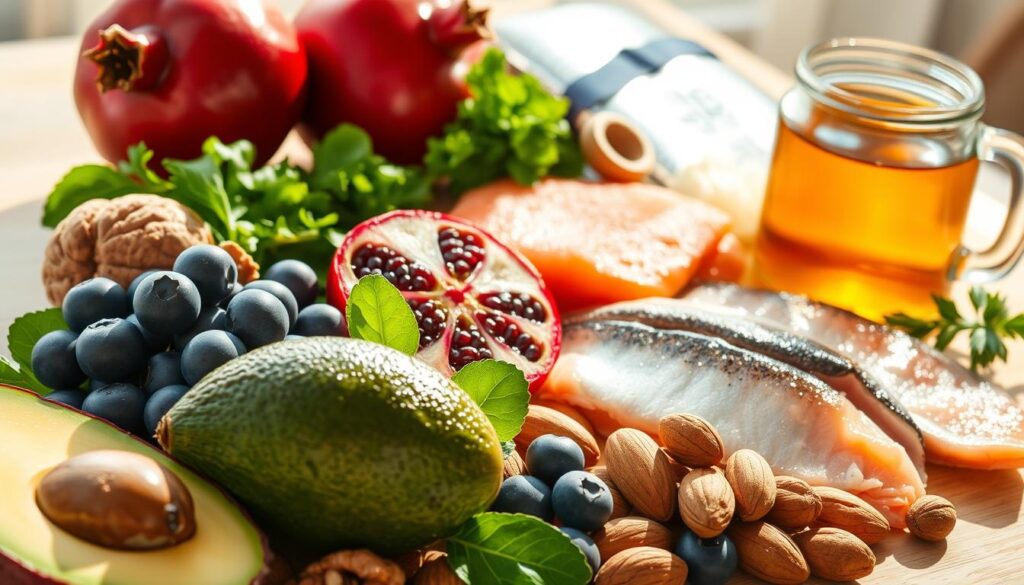
Looking into good nutrition for brain health can really help our thinking skills as we get older. Eating foods full of important nutrients is key to keeping our minds sharp. Diets like the Mediterranean, DASH, and MIND diets are known for their benefits. They focus on whole foods, giving us the vitamins and minerals our brains need.
The Mediterranean diet is all about eating fruits, veggies, whole grains, and healthy fats like olive oil. Studies show it can lower the risk of dementia. The DASH diet, made for blood pressure, also helps brain health with its nutrient-rich foods. The MIND diet combines these, adding leafy greens and berries for better brain function.
Mixing up our meals makes food taste better and ensures we get all the nutrients we need. Eating healthy fats like omega-3s from fish, walnuts, and flaxseeds helps our brain cells. Choosing whole grains and foods high in fibre gives us energy without the bad stuff in processed foods.
As we age, our brains change, and we need to pay more attention to what we eat. Brain decline starts early, with big changes happening over time. So, it’s important to eat in a way that supports our brain health all our lives.
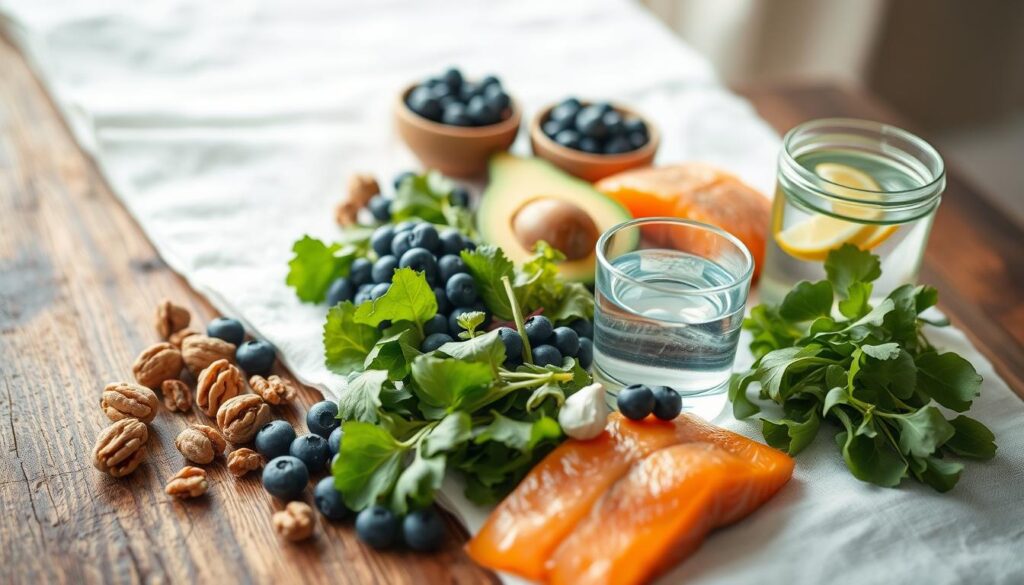
| Diet Type | Main Components | Brain Health Benefits |
|---|---|---|
| Mediterranean Diet | Fruits, vegetables, whole grains, olive oil, fish | Reduces dementia risk |
| DASH Diet | Lean proteins, whole grains, fruits, vegetables | Supports overall brain function |
| MIND Diet | Leafy greens, berries, nuts, whole grains | Improves cognitive abilities; equates to being 7.5 years younger |
With more people facing brain problems as they age, eating well is more important than ever. Making healthy food choices is key to keeping our minds sharp as we get older.
Research shows a strong link between healthy eating and mental health. Changing what we eat can really improve our mood and overall happiness. Eating regularly helps keep our blood sugar stable, which can make us feel less tired and irritable.
Not drinking enough water can make us feel down, tired, and unfocused. Drinking enough water is key for our brain health. Foods like olive oil, nuts, seeds, and oily fish boost our brain function. On the other hand, trans fats in processed foods can harm our mood and heart health.
Eating lots of whole grains, fruits, and veggies gives us important vitamins and minerals for our brain and body. It’s also important to eat protein in every meal. Protein helps control our mood and keeps our energy levels steady. Our gut health also affects our mental state, and eating foods like fruits, veggies, beans, and probiotics can help keep our gut healthy.
Too much caffeine or caffeine too late in the day can make us feel moody, disrupt our sleep, and cause anxiety. Practicing mindfulness and mindful eating can help us have a better relationship with food. Sharing meals with others can also improve our mental health by building social connections.
Many adults are aware of how diet affects mental health and want to make changes. A survey found that 66% of adults know how diet impacts mental wellness, and 81% are willing to change their eating habits for the better. Eating more fruits and veggies has been linked to better mental health, with daily veggie intake reducing depression symptoms.

| Dietary Factor | Impact on Mental Wellness |
|---|---|
| Regular Meal Consumption | Stabilises blood sugar; reduces irritability |
| Hydration | Boosts mood and concentration |
| Healthy Fats | Supports cognitive function |
| Processed Foods | Linked to mood and heart health decline |
| Whole Foods | Provides essential nutrients for brain health |
| Protein | Helps regulate mood |
| Gut Health | Influences mental well-being |
| Caffeine | May cause anxiety and sleep issues |
| Shared Meals | Enhances social bonding and emotional well-being |
Omega-3 fatty acids are key for brain health and thinking skills. They are found mainly in fish oil. Studies show they boost memory, learning, and mood.
Eating enough omega-3s is important. Here are some good sources:
Eating these foods often helps meet our omega-3 needs. But, only a small part of what we eat is turned into the active forms EPA and DHA.
Research backs the benefits of omega-3s for the brain. Pregnant women eating more fish can have smarter kids. Studies also link DHA to better brain health in older adults.
One study found that 900 mg DHA daily improved memory in 485 older adults. Another study showed 1.8 grams of omega-3s a day helped those with mild cognitive issues.
Omega-3s are vital for brain health over time. Even small increases can help, even for those at risk. As research grows, omega-3s look promising for brain health and mood.

Recently, there’s been a lot of talk about how processed foods affect our brains. Research shows that eating a lot of processed foods can harm our thinking skills. For example, eating more ultra-processed foods can increase the risk of brain problems by 16%.
On the other hand, eating whole foods can help keep our brains sharp. Studies found that eating more of these foods can lower the risk of brain decline by 12%. This shows how important it is to eat foods that are good for our brains.
Processed foods can also increase the risk of having a stroke. Eating more of these foods can raise the risk by 8%. But, eating more whole foods can lower this risk by 9%. This makes it clear that choosing the right foods is key to staying healthy.
It’s also important to think about who is most affected by these foods. Research shows that Black people are more at risk from the negative effects of processed foods on stroke risk. This shows we need to give dietary advice that fits different groups of people.
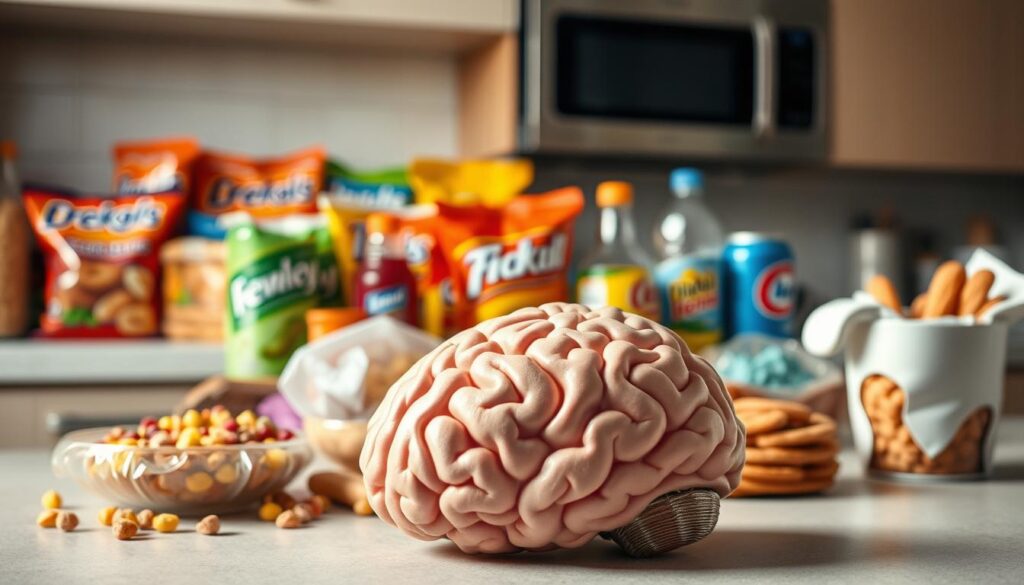
In the US, about 60% of what we eat is processed. And 70% of packaged foods are ultra-processed. This high amount of processed foods can lead to brain problems, depression, and anxiety. It’s a big problem for our health.
Processed foods are not just bad for our brains. They are also linked to serious health issues like diabetes, obesity, and cancer. Cutting down on these foods is key to improving our brain health and overall well-being.
| Food Type | Cognitive Impairment Hazard Ratio | Stroke Hazard Ratio |
|---|---|---|
| Ultra-Processed Foods | 1.16 | 1.08 |
| Unprocessed/Minimally Processed Foods | 0.88 | 0.91 |
Adding brain-boosting foods to your diet can really help your brain. Eating the right foods can improve your memory, focus, and mood. It’s all about getting the right nutrients through good meal plans and mixing foods in clever ways.
Here are some meal plans that are good for your brain:
| Meal | Ingredients | Brain Health Benefits |
|---|---|---|
| Breakfast | Oatmeal with blueberries and walnuts | Rich in antioxidants and omega-3s to enhance memory. |
| Lunch | Quinoa salad with spinach, chickpeas, and a sprinkle of olive oil | Provides choline and polyunsaturated fats for brain function. |
| Snack | Dark chocolate with 70% cocoa | May improve memory and reduce age-related cognitive decline. |
| Dinner | Grilled salmon with sweet potatoes and broccoli | High in omega-3s and vitamin K, supporting cognitive health. |
| Dessert | Orange slices | Delivers vitamin C, boosting focus and decision-making. |
Mixing different brain foods can be very beneficial. Here are some great combinations:
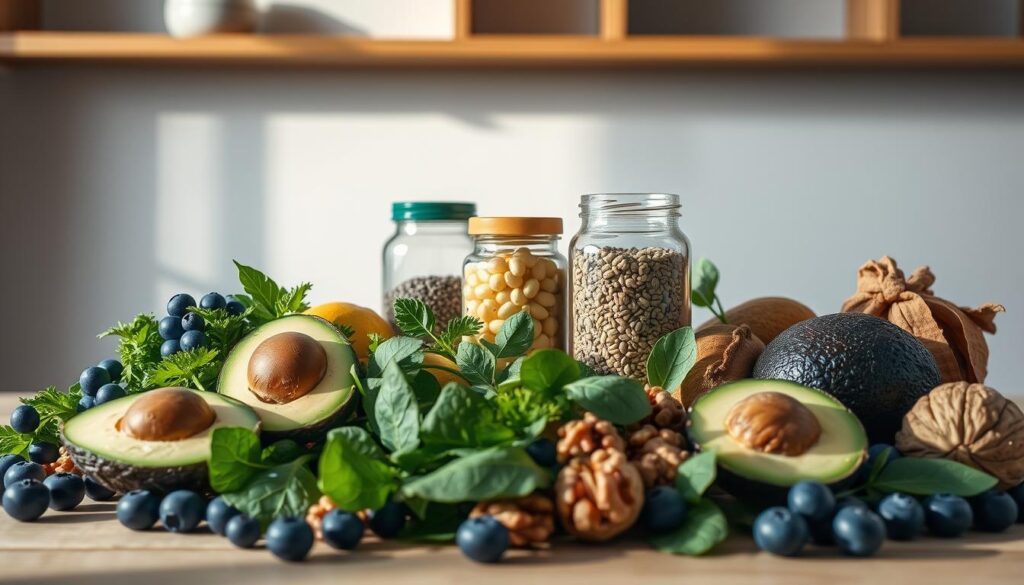
Keeping our brains healthy is key, more so as we get older. The link between what we eat and brain health is clear. Choosing the right foods can help fight off brain decline as we age.
Studies show that low-fat diets help protect our brains. Foods rich in B vitamins and iron also boost brain function. This is important for staying sharp.
Diets like the Mediterranean, Nordic, DASH, and MIND diets are great for the brain. They focus on whole foods like fruits, veggies, nuts, and grains. They also cut down on red meat and sugar.
This way of eating is good for the brain and heart. It helps prevent heart disease too.
The gut-brain axis shows how important gut health is for the brain. Foods high in fibre and probiotics help our brains work better. Starting healthy eating habits early is key for brain health later on.
It’s important to focus on brain health in our 40s and 50s. This can help prevent dementia. Research shows that managing diseases like diabetes and heart disease can also help the brain.
Research on diet and brain health is vast. Over 612 studies have looked into this topic. So, eating right is a smart way to keep our brains healthy.

Optimising diet is key to better brain health and thinking skills. We’ve looked at how food affects our minds, highlighting good eating habits. Eating right, like the MIND diet, can really help, even cutting down Alzheimer’s risk.
Studies from the Rush Memory and Aging Project show a 53% lower Alzheimer’s rate for those eating well. Eating a balanced diet is linked to better mental and thinking health. Foods like leafy greens, berries, fatty fish, and nuts help keep our brains sharp.
In short, eating healthily is more than just for our bodies. It’s also about keeping our minds sharp as we get older. Choosing a brain-friendly diet can improve our lives and protect our brains for the future. So, focusing on nutrition is a smart move for our mental health over time.